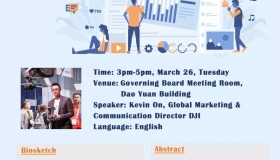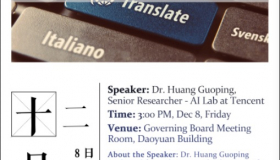Mitigating Disaster Risks to Sustain Growth
|
Topic: |
Mitigating Disaster Risks to Sustain Growth |
|
|
Time&Date: |
9:30-10:45 am, 2020/4/24 (Friday) |
|
|
Venue: |
Zoom Meeting ID: 797-219-7353 |
|
|
Speaker: |
Prof. Neng Wang (Columbia University) Neng Wang is Chong Khoon Lin Professor of Real Estate and Finance at Columbia Business School and a visiting professor at CKGSB. He is also a Research Associate (Senior Research Fellow) at the National Bureau of Economic Research (NBER), a Senior Research Fellow at Asian Bureau of Financial and Economics Research (ABFER), and an Academic Member of the Luohan Academy. He has widely published in leading economics, finance, and business journals. Among other awards and honors, he won a Smith-Breeden Distinguished Paper Prize awarded by the Journal of Finance, and the Bettis Distinguished Scholar Award from Carey School of Business, Arizona State University. He is an Associate Editor at the Journal of Finance and was an Editor in the Finance area at the Management Science. His research interests include corporate finance, contract theory, financial institutions, asset pricing, asset allocation, sovereign debt and international finance, risk management, entrepreneurial finance, household finance, wealth distribution, macroeconomics, private equity, hedge funds, investor protection, real estate finance, FinTech, and the Chinese economy. He has taught courses at both MBA and PhD levels including advanced corporate finance, entrepreneurial finance and private equity, fixed income securities and markets, financial institutions, risk management, real estate finance, corporate finance theory, and continuous-time finance. He received B.S. in Physical Chemistry from Nanjing University, China in 1992, M.S. in Chemistry from California Institute of Technology (Caltech) in 1995, M.A. in International Relations from the University of California, San Diego (UCSD) in 1997, and Ph.D. in Finance from the Graduate School of Business at Stanford University in 2002. |
|
|
Abstract: |
We provide the planner's solution to a model where households learn from exogenous natural disaster arrivals about arrival rates and spend to mitigate future damages. Mitigation cannot be decentralized due to positive externalities from curtailing aggregate risks. First-best can be implemented by capital taxes and mitigation subsidies. Willingness-to-pay, toward public health for pandemics or environmental protection for climate disasters, depends on mitigation efficacy. Efficacy can be inferred from damage functions that depend on prior arrivals which determine preparedness. Regulatory risks arise since disaster leads to pessimistic arrival-rate beliefs and taxes or mandates to fund mitigation, which reduce consumption, investment and stock-market value. |




